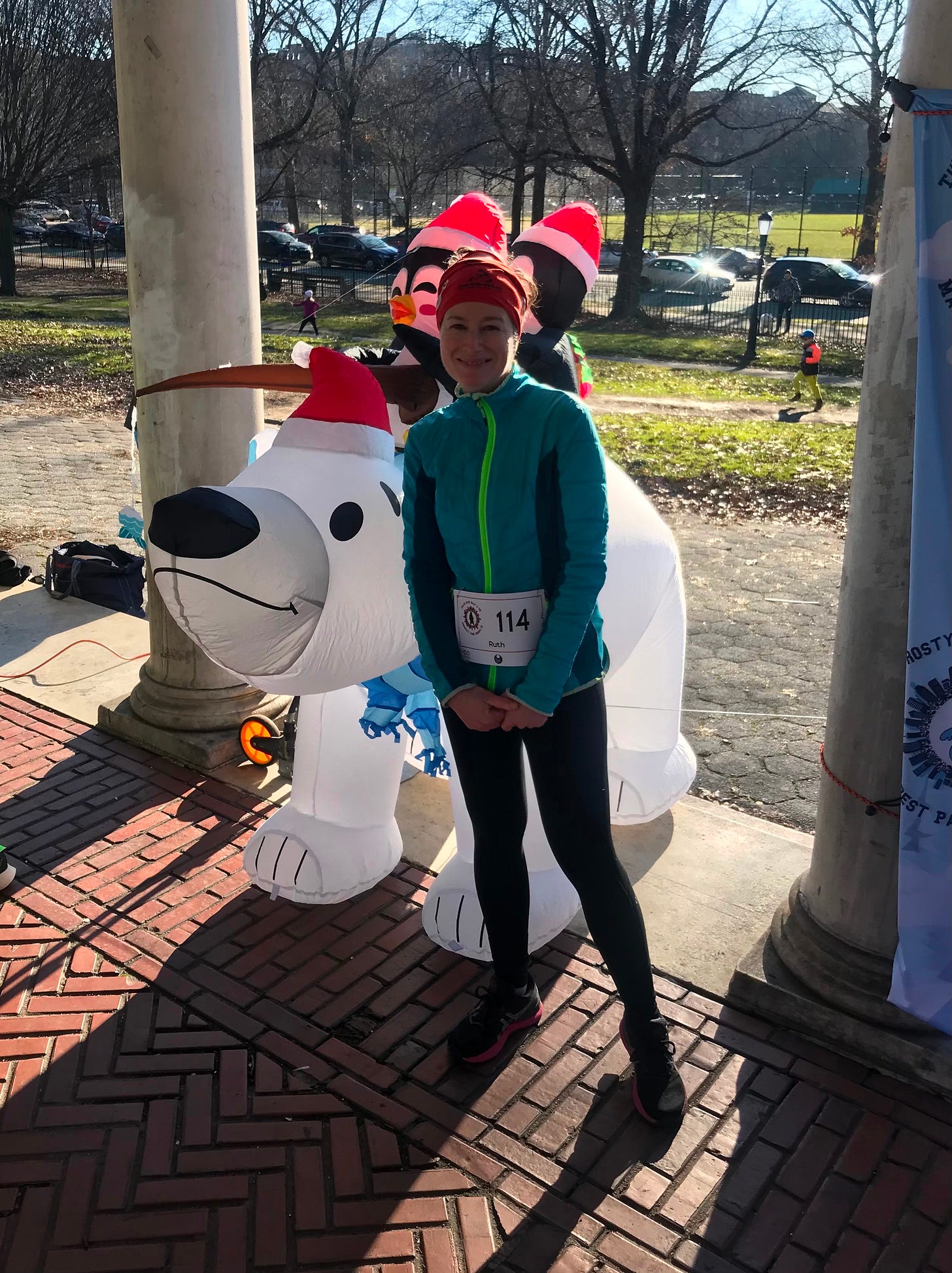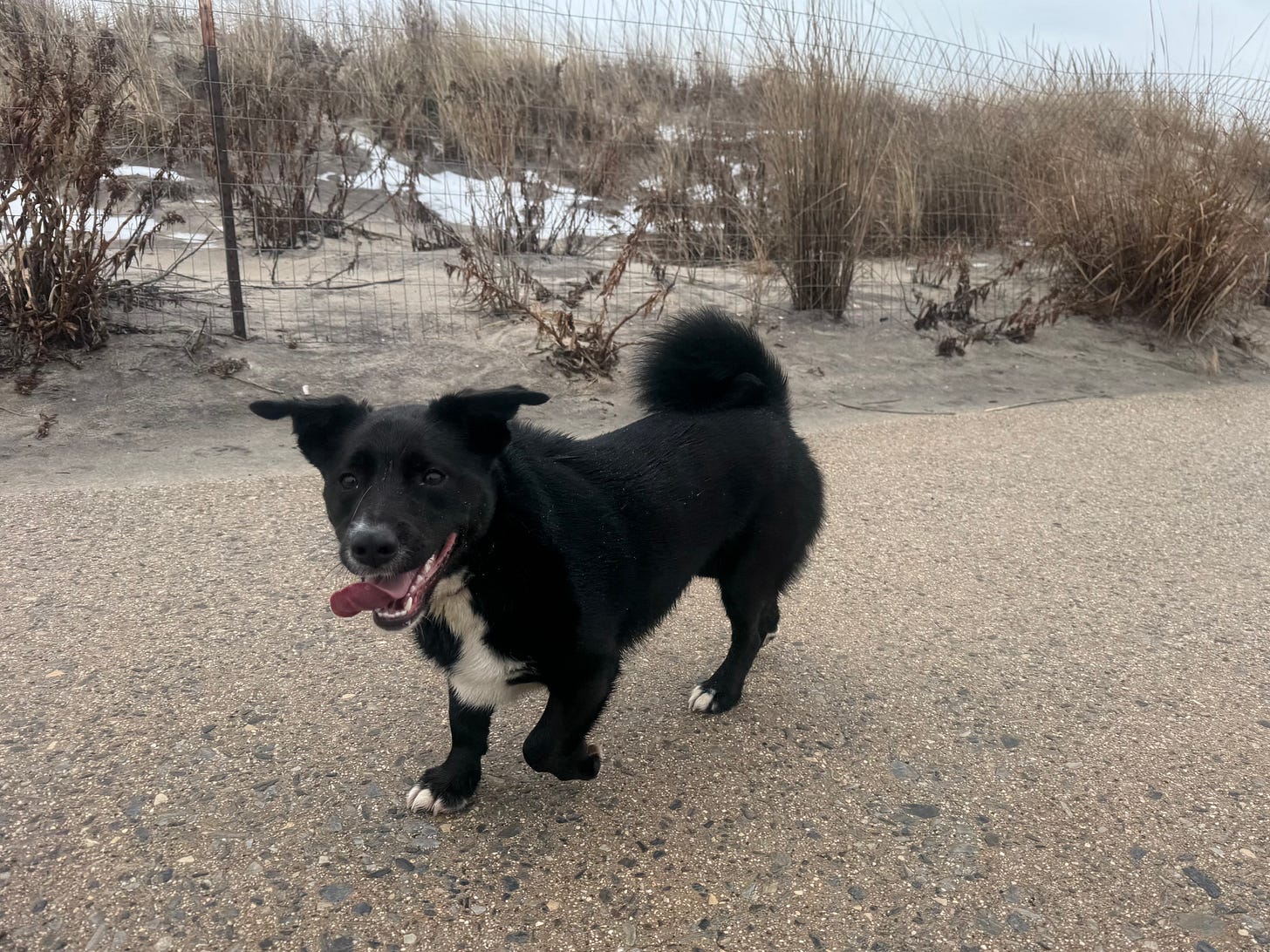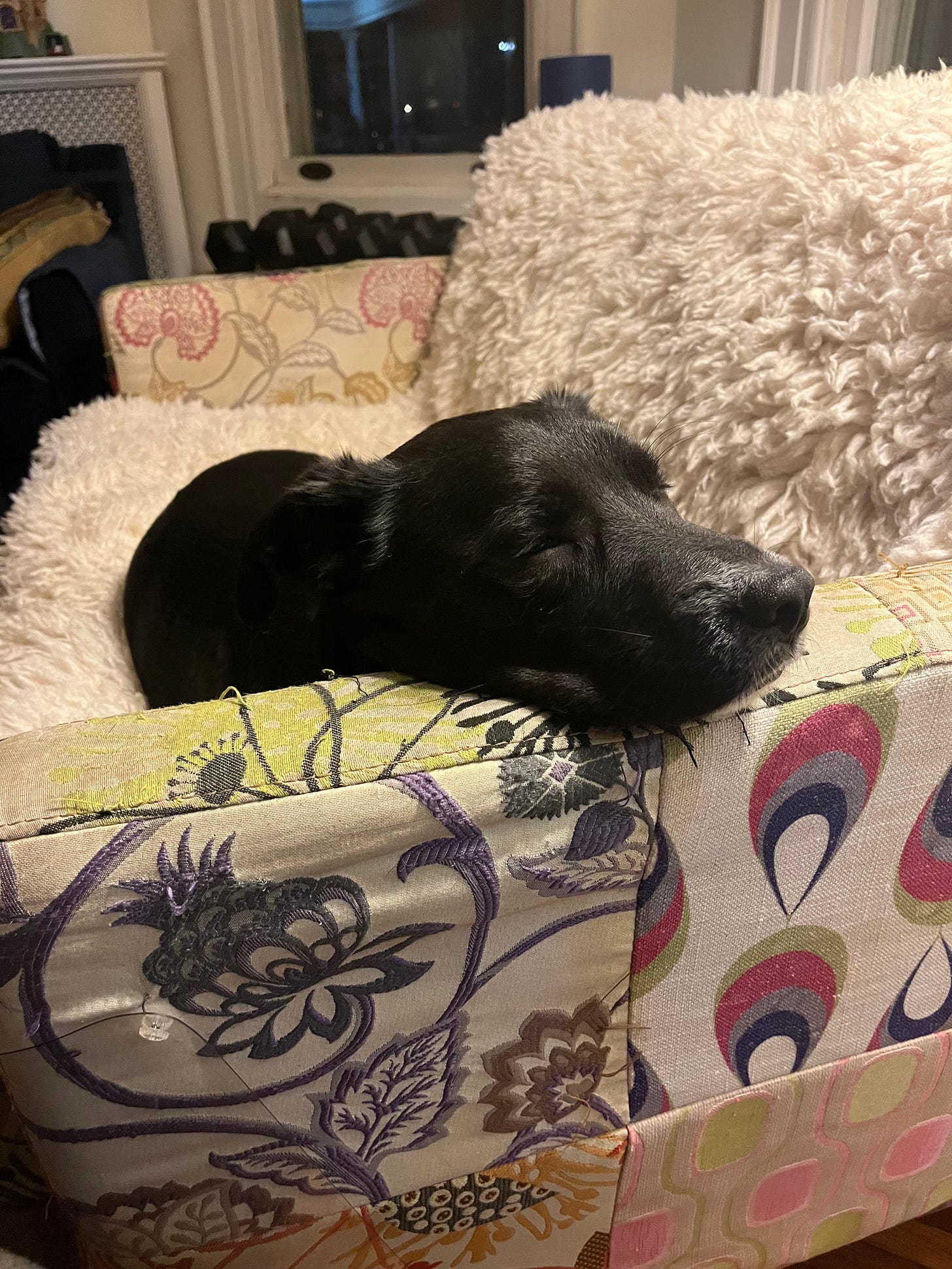In the summer of 2022, I had a freak accident. I was taking a post-run shower when the shower head—a large “rainfall” style installed ineptly by the previous owners of our house—crashed down on my right foot and nearly severed part of my second toe. I was in a boot for six weeks.
The doctor who treated me reassured me that I would be able to run again. I’ve been a distance runner since high school, when on a whim I joined the cross country team. In the intervening decades, I’ve had to take breaks from running—mainly for pregnancies and injuries—but they’ve always been temporary.
This break lasted longer than the others. I was happy just to be walking normally again—why push it? And as a woman of a certain age (read: perimenopausal), I kept hearing that I should dial back on cardio and focus on strength training. I became a devotee of Caroline Girvan. My family adopted an adorable puppy who grew into a high-energy dog requiring an hour and a half of exercise each day, mostly in the form of walks with me. When I recently cleaned out my closet, I put my winter running gear away in the back.
A few weeks ago, I woke up and thought, I want to go for a run.
*
When my husband and I were thinking about getting a dog, I pictured myself in the park with a husky mix or some other tall, long-legged specimen trotting gamely by my side.
The dog we wound up with does not have a runner’s body. He’s short and stocky, a “low rider.” People often ask if he’s a Corgi mix, which is how he was advertised on Petfinder. (According to a dog DNA test, he’s a Lab/German Shepherd/Beagle/Pit Bull.)
Our sofa soon bore evidence that walks around the neighborhood were not enough exercise for him, so I started taking him to the dog park a few times a week to chase and be chased. As he got older and we began to explore the local off-leash options, I was startled by the amount of ground he could cover. His little legs would carry him back and forth across a meadow the size of a football field, up and down hills, in the company of other dogs or alone, for an hour or more. All the while he beamed with joy.
Could this ridiculous little guy be my running partner?
*
I don’t have a runner’s body anymore either. This year I turned 50. Thanks to my new regimen of more strength training and less cardio, I’ve gained a few pounds and redistributed a few others—not always where I want them.
I figured it was best for both of us to start slow, so I downloaded a “Couch to 5K” app. Couch to 5K is a beginner program that alternates running with walking. The first workout involves intervals of 60 seconds of running and 90 seconds of walking, for 20 minutes. The old me would have considered this beneath her, but I was worried about how the dog’s little legs would hold up to a longer run.
My dog doesn’t have the best leash manners—he’ll stop short to investigate some fascinating smell or lunge after a squirrel. I usually let him sniff for a little while and then use treats to keep him moving, with varying degrees of success.
But on our first run, he picked up on what I wanted right away. Our partnership wasn’t seamless—I stepped on him while we were trying to turn a corner. Still, the constant switching between walking and running kept his attention on me.
Back at home, he lapped up an entire bowl of water, ate a big breakfast, and conked out for four hours.
*
“It was a good workout for him, but for me it was more of a warm-up,” I bragged to my husband afterward. But later, as the soreness set in, I was grateful I had held back—and not just for the dog’s sake.
People who practice Zen talk about cultivating a “beginner’s mind.” In his book Zen Mind, Beginner’s Mind, Shunryu Suzuki teaches, “In the beginner’s mind there are many possibilities. In the expert’s mind there are few.” Like so much else, this idea has been co-opted by the productivity industry as an ancient secret of success. An article in Forbes exhorts readers to be “open to new possibilities” because that makes us “more likely to see opportunities that we would have otherwise missed” and to “take risks and try new things.”
But in Zen Buddhism, to have a beginner’s mind means to give up ego, to accept what is, to be receptive to what comes. Suzuki counsels his students to try to maintain this outlook even as they gain experience and expertise. The practice of radical humility trickles outward into all aspects of life.
With my latest book out in the world, I’m now officially “between projects.” As I restart my running practice as a beginner, I’m wondering: is this a new opportunity to cultivate beginner’s mind in my work?
As writers, we feel constant pressure to acquire and display expertise, whether it’s by landing high-profile assignments or by trumpeting our achievements on social media. What if it were just as laudatory to be a beginner—to embrace all that we don’t know? To enjoy looking up from the bottom of the cliff rather than cling precariously to the top?
*
I heard back from many of you that you’re interested in reading banned books. Let’s do it! The first book will be Crank by Ellen Hopkins. It’s apparently about drug abuse and is available everywhere. We’ll discuss it in Substack Chat starting in a month or so.
All best,
Ruth
p.s. I have events for The Many Lives of Anne Frank booked into the summer. Here’s where I’ll be for the next few weeks:
March 19, 6:30 p.m: National Arts Club in conversation with Meg Wolitzer (Manhattan)
March 20, 8 p.m.: Congregation Kol Israel in conversation with Menachem Kaiser (Brooklyn)
March 27, 7:30 p.m.: 92Y in conversation with Rabbi David Ingber (in person and online)






This was quietly beautiful—funny, grounded, and filled with that kind of wisdom that sneaks up on you. I especially loved the idea of “beginner’s mind” not as a hack for productivity, but as a spiritual posture. Your reflections on aging, authorship, and humility landed deeply. Also: the image of your short-legged “low rider” joyfully running beside you is going to stay with me—such a sweet metaphor for unlikely momentum. Thank you for this reminder to move, to soften, and to begin again.
This is great inspiration for me in so many ways! Thank you so very much. I work as a consultant and relate to the pressure to always be the expert. Two of my strengths are bringing fresh eyes and 30+ years of experience. As soon as I read the phrase "beginner's mindset" I could see immediate applicability to me work. I am nursing an age related back and leg injury and as I resume movement think this is a wise approach.